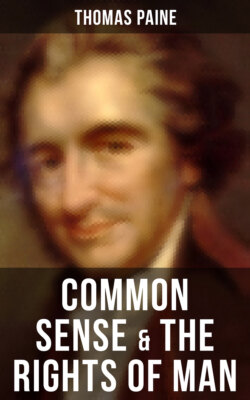Common Sense & The Rights of Man

Реклама. ООО «ЛитРес», ИНН: 7719571260.
Оглавление
Thomas Paine. Common Sense & The Rights of Man
Common Sense & The Rights of Man
Reading suggestions
Common Sense
On the Origin and Design of Government in General, with Concise Remarks on the English Constitution
Of Monarchy and Hereditary Succession
Thoughts on the Present State of American Affairs
Of the Present Ability of America: with some Miscellaneous Reflections
The Rights of Man
PART I. Being an answer to Mr. Burke's attack on the French Revolution
The Author's Preface to the English Edition
The Author's Preface to the French Edition
Rights of Man
Declaration Of The Rights Of Man And Of Citizens By The National Assembly Of France
Observations on the Declaration of Rights
Miscellaneous Chapter
Conclusion
PART II. Combining Principle and Practice
Preface
Introduction
Chapter I. Of Society and Civilisation
Chapter II. Of the Origin of the Present Old Governments
Chapter III. Of the Old and New Systems of Government
Chapter IV. Of Constitutions
Chapter V. Ways And Means Of Improving The Condition Of Europe Interspersed With Miscellaneous Observations
Appendix
The Life Of Thomas Paine. by Moncure D. Conway
Preface
Chapter I. Early Influences
Chapter II. Early Struggles
Chapter III. Domestic Trouble
Chapter IV. The New World
On March 4, 1775, Paine writes Franklin from Philadelphia
Chapter V. Liberty And Equality
Chapter VI. "Common Sense"
Chapter VII. Under The Banner Of Independence
Chapter VIII. Soldier And Secretary
Chapter IX. French Aid, And The Paine-deane Controversy
Chapter X. A Story By Gouverneur Morris
Chapter XI. Cause, Country, Self
Chapter XII. A Journey To France
Chapter XIII. The Muzzled Ox Treading Out The Grain
Chapter XIV. Great Washington And Poor Paine
Chapter XV. Pontifical And Political Inventions
Chapter XVI. Returning To The Old Home
Chapter XVII. A British Lion With An American Heart
Chapter XVIII. Paine's Letters To Jefferson In Paris
Chapter XIX. The Key Of The Bastille
Chapter XX. "The Rights Of Man"
Chapter XXI. Founding The European Republic
Chapter XXII. The Right Of Evolution
Chapter XXIII. The Deputy For Calais In The Convention
Chapter XXIV. Outlawed In England
Chapter I. "Kill The King, But Not The Man"
Chapter II. An Outlawed English Ambassador
Chapter III. Revolution vs. Constitution
Chapter IV. A Garden In The Faubourg St. Denis
Chapter V. A Conspiracy
Chapter VI. A Testimony Under The Guillotine
Chapter VII. A Minister And His Prisoner
Chapter VIII. Sick And In Prison
Chapter IX. A Restoration
Chapter X. The Silence Of Washington
Chapter XI. "The Age Of Reason"
Chapter XII. Friendships
Chapter XIII. Theophilanthropy
Chapter XIV. The Republican Abdiel
Chapter XV. The Last Year In Europe
Chapter XVI. The American Inquisition
Chapter XVII. New Rochelle And The Bonnevilles
Chapter XVIII. A New York Prometheus
Chapter XIX. Personal Traits
Chapter XX. Death And Resurrection
Appendix A. The Cobbett Papers
Thomas Paine, A Sketch Of His Life And Character
Appendix B. The Hall Manuscripts
Appendix C. Portraits Of Paine
Отрывок из книги
Thomas Paine
Common Sense
.....
Are these things examples to hold out to a country regenerating itself from slavery, like France? Certainly they are not, and certain am I, that when the people of England come to reflect upon them they will, like France, annihilate those badges of ancient oppression, those traces of a conquered nation. Had Mr. Burke possessed talents similar to the author of "On the Wealth of Nations." he would have comprehended all the parts which enter into, and, by assemblage, form a constitution. He would have reasoned from minutiae to magnitude. It is not from his prejudices only, but from the disorderly cast of his genius, that he is unfitted for the subject he writes upon. Even his genius is without a constitution. It is a genius at random, and not a genius constituted. But he must say something. He has therefore mounted in the air like a balloon, to draw the eyes of the multitude from the ground they stand upon.
Much is to be learned from the French Constitution. Conquest and tyranny transplanted themselves with William the Conqueror from Normandy into England, and the country is yet disfigured with the marks. May, then, the example of all France contribute to regenerate the freedom which a province of it destroyed!
.....